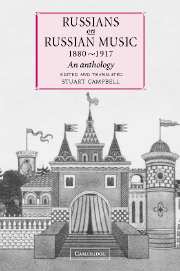Book contents
Chapter Five - Moscow and her composers
Published online by Cambridge University Press: 09 November 2009
Summary
(a) N. D. Kashkin: The Moscow School in Music. An Essay by Prof. N. D. Kashkin. New Word, June 1910, no. 6, pp. 53–8
This greatly curtailed essay outlines a general picture, some aspects of which are examined in later articles.
In the luxuriant flowering which Russian music has achieved at present, seniority and initiative belong to St Petersburg. It was in St Petersburg that Glinka and his immediate successors lived and worked, and it was there too that the first Russian Conservatoire was opened just when some of the St Petersburg intelligentsia were begetting the group of musicians who called themselves the ‘young Russian school’ but who had the comic nickname the ‘Mighty Handful’ as well. In regard to music, Moscow emerged independently much later, and the origins of the Moscow school may be dated to the opening of the Moscow Conservatoire, whose first teachers of music theory were P. I. Tchaikovsky and G. A. Laroche – who had both previously completed the course at the St Petersburg Conservatoire.
The group of Moscow composers is very large and active at present, but we do not count all its members among the Moscow school; thus, for instance, A. T. Grechaninov and M. M. Ippolitov-Ivanov live and continue their activities in Moscow, but both are alumni of the St Petersburg Conservatoire, although the former is indebted for a significant part of his musical education to Moscow and its Conservatoire.
We intend, first of all, to define what, in our view, should be called the Moscow school.
Tchaikovsky began his career both as composer and teacher in Moscow in 1866.
- Type
- Chapter
- Information
- Russians on Russian Music, 1880–1917An Anthology, pp. 168 - 197Publisher: Cambridge University PressPrint publication year: 2003



